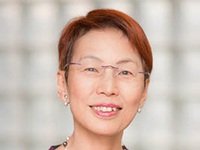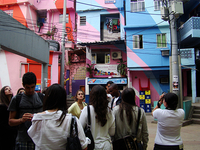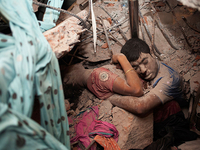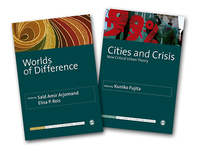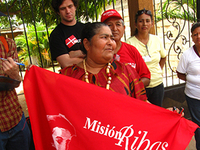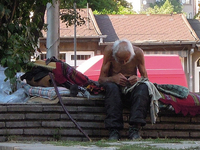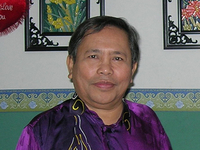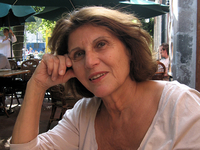GD 3.4 - August 2013
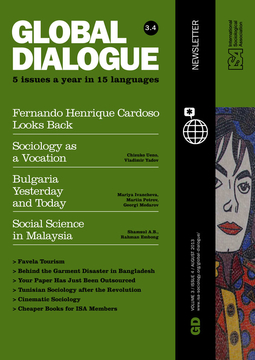
Global Dialogue is available in multiple languages!
Select the language to download the issue.
Editors:
Michael Burawoy.
Associate Editor:
Margaret Abraham, Tina Uys, Raquel Sosa, Jennifer Platt, Robert Van Krieken.
Managing Editors:
Lola Busuttil, August Bagà.
Consultants:
Abigail Andrews.
Media Consultant:
Annie Lin, José Reguera.
Consulting Editors:
Izabela Barlinska, Louis Chauvel, Dilek Cindoğlu, Tom Dwyer, Jan Fritz, Sari Hanafi , Jaime Jiménez, Habibul Khondker, Simon Mapadimeng, Ishwar Modi, Nikita Pokrovsky, Emma Porio, Yoshimichi Sato, Vineeta Sinha, Benjamín Tejerina, Chin-Chun Yi, Elena Zdravomyslova.
REGIONAL EDITORS
Arab World: Sari Hanafi , Mounir Saidani.
Brazil: Gustavo Taniguti, Juliana Tonche, Andreza Galli, Renata Barreto Preturlan, Ângelo Martins Júnior, Lucas Amaral, Celia Arribas.
Colombia: María José Álvarez Rivadulla, Sebastián Villamizar Santamaría, Andrés Castro Araújo, Katherine Gaitán Santamaría.
India: Ishwar Modi, Rajiv Gupta, Rashmi Jain, Uday Singh.
Iran: Reyhaneh Javadi, Shahrad Shahvand, Hamidreza Rafatnejad, Tara Asgari Laleh, Najmeh Taheri, Saghar Bozorgi, Faezeh Khajezadeh.
Japan: Kazuhisa Nishihara, Mari Shiba, Kousuke Himeno, Tomohiro Takami, Yutaka Iwadate, Kazuhiro Ikeda, Yu Fukuda, Michiko Sambe, Takako Sato, Yuko Hotta, Yusuke Kosaka, Yutaka Maeda, Shuhei Naka.
Poland: Mikołaj Mierzejewski, Karolina Mikołajewska, Krzysztof Gubański, Adam Mueller, Patrycja Pendrakowska, Emilia Hudzińska, Julia Legat, Kamil Lipiński, Natalia Jońca.
Romania: Cosima Rughiniș, Ileana-Cinziana Surdu, Monica Alexandru, Telegdy Balasz, Marian Mihai Bogdan, Adriana Bondor, Ramona Cantaragiu, Miriam Cihodariu, Alexandra Duțu, Cătălina Gulie, Angelica Helena Marinescu, Monica Nădrag, Lucian Rotariu, Cosima Rughiniș, Alina Stan, Mara Stan, Elena Tudor, Cristian Constantin Vereș.
Russia: Elena Zdravomyslova, Eleonora Burtseva, Anna Kadnikova, Elena Nikiforova, Julia Martinavichene, Ekaterina Moskaleva, Asja Voronkova.
Taiwan: Jing-Mao Ho.
Turkey: Aytül Kasapoğlu, Nilay Çabuk Kaya, Günnur Ertong, Yonca Odabaş, Zeynep Baykal, Gizem Güner.
Ukraine: Svitlana Khutka, Olga Kuzovkina, Anastasia Denisenko, Mariya Domashchenko, Iryna Klievtsova, Lidia Kuzemska, Anastasiya Lipinska, Myroslava Romanchuk, Ksenia Shvets, Liudmyla Smoliyar, Oryna Stetsenko, Polina Stohnushko.
GD 3.4 - August 2013
Editorial
For a New Sociology
Collective indignation continues to blaze a trail across the world – of late, carrying its torch from Gezi Park and Taksim Square to the major cities of Brazil and now, as I write, Egypt has been reignited by a popular uprising of unprecedented proportions. The crowds in Tahrir Square display a great refusal of the (re)expropriation of politics, albeit with uncertain and tragic outcomes. These culturally interdependent yet politically independent protests that now span the planet call for a new theory of social movements, and, from there, a new sociology that reaches for the global.
Such a new sociology must grapple with the intertwining of politics and economics, so in this issue Global Dialogue exposes the political underbelly of capitalism’s third wave of marketization, known colloquially as neoliberalism. Thus, Mallika Shakya analyzes the geopolitics of the distribution of garment production that has produced the disaster in Bangladesh while Bianca Freire-Medeiros describes the promotion of favela tourism in which successive political regimes of Brazil capitalize on poverty. Jeff Sallaz analyzes how publishers are making unbelievable profits from outsourcing, by relying on us (or our libraries) to buy back at inflated prices the very products we produce! Moving further afield, in an engaging personal history, Rahman Embong tells us how sociology has been pushed aside as the top Malaysian universities seek out those disciplines that will deliver short-term profits with long-term political quiescence.
Where, then, might we find such a new sociology? I’ve been following a postcommunist generation of critical sociologists emerging in Eastern Europe – Poland, Ukraine, Romania, and East Germany. In these pages three young sociologists from Bulgaria challenge the terms of national debates. Martin Petrov describes the life course of the down and out – the detritus of both new and old regimes, competing for distinction on the streets of Sofia. Georgi Medarov traces the complex patterns of backward-looking politics targeting former communists – thereby giving them a ghostly existence – but with the additional motive of exonerating Bulgaria from its fascist past. In so doing attention is deflected from fascist tendencies of the present. Mariya Ivancheva reflects critically on her own early embrace of the democratic transition by traveling as far as Venezuela to explore the dilemmas of another socialism and to see what lessons and insights it holds for Eastern Europe. All three are trying to weave a sociology that interrogates the past for a way out of the present.
A new sociology requires new methods to excavate the polyphonic layers of history and society. There’s no better place to begin than Jordanna Matlon’s interview with Joyce Sebag and Jean-Pierre Durand about their program in cinematic sociology at the University of Evry. In line with their cinematic project I would like to extend an open invitation to submit photo-essays (a high-resolution photo plus a 300 word interpretation) for publication in Global Dialogue.
Michael Burawoy, editor of Global Dialogue
Global Dialogue can be found in multiple languages.
Submissions should be sent to globaldialogue@isa-sociology.org.


